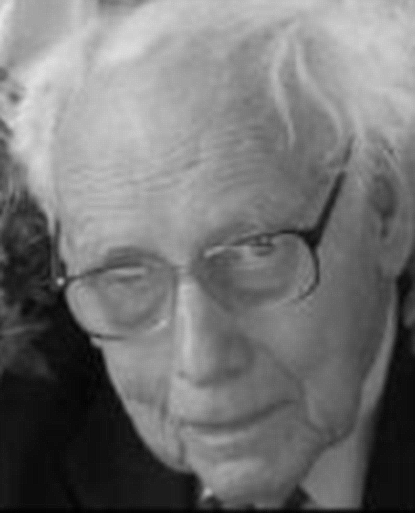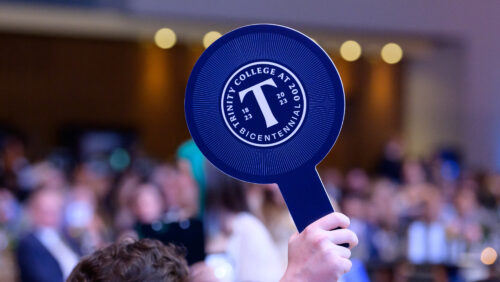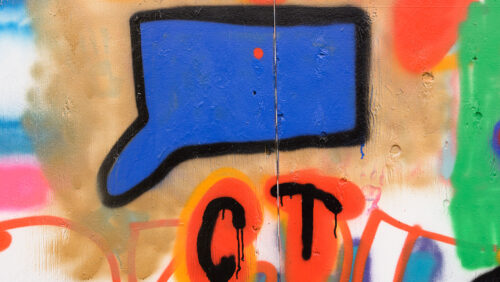 Professor Emeritus Albert Gastmann retired in 1990 after 36 years of teaching political science at Trinity. His dedication to Trinity and its students will live on in perpetuity because he directed that the majority of his estate—a bequest that will exceed $2.5 million—would go to the College to provide support in three ways: 1) enhancing resources for the Political Science Department, such as visiting lecturers, field trips, and library purchases, 2) funding the Gastmann Initiative in International Organizations and Programs, which will support Trinity's Rome campus programs, and 3) establishing a Trinity scholarship fund giving preference to students from the Netherlands or the Netherland Antilles.
Professor Emeritus Albert Gastmann retired in 1990 after 36 years of teaching political science at Trinity. His dedication to Trinity and its students will live on in perpetuity because he directed that the majority of his estate—a bequest that will exceed $2.5 million—would go to the College to provide support in three ways: 1) enhancing resources for the Political Science Department, such as visiting lecturers, field trips, and library purchases, 2) funding the Gastmann Initiative in International Organizations and Programs, which will support Trinity's Rome campus programs, and 3) establishing a Trinity scholarship fund giving preference to students from the Netherlands or the Netherland Antilles.
"This is a remarkable gift, for which we are very grateful," says President James F. Jones, Jr. "Professor Gastmann's contributions as a teacher, author, and in furthering crosscultural understanding are legendary at Trinity. To bequeath nearly his entire estate for the benefit of Trinity students and faculty is a breathtaking act of love and generosity."
Gastmann's Political Science Department colleague and close friend, Professor Brigitte "Gitte" Schulz, explains, "This bequest will allow us to take our students to the United Nations in New York and even on trips to visit Geneva, Brussels, Paris, and Rome. It will allow us to bring political science students from the Netherlands and the Dutch Caribbean to Hartford and also enable a faculty exchange program."
Schulz adds, "Bert wanted to make sure that the Political Science Department would offer ample opportunities for students to explore the wider world. He wanted American students to hear professors with different accents, to travel abroad to experience other cultures, to study with students from other lands. In a word, he was interested in turning Trinity students into citizens of the world."
"An educated person is multilingual"
Albert Gastmann was a much-respected teacher and friend to hundreds—indeed thousands—of students. He stayed in contact with many former students long after graduation, attended their weddings, met them for dinner, or sometimes dropped by for an unexpected visit.
The extent to which Gastmann remained in touch with friends on multiple continents was apparent from his address book, which his former student and close friend Philip Wellman '86 says was the first one he ever saw organized by place, rather than by name. For example, under "G," one would find all of Gastmann's contacts in Geneva, and there were more than a few.
After Gastmann's death in February 2007, at the age of 87, an extended family of Trinity alumni, colleagues, and friends gathered at the College Chapel to share favorite memories of their friend and mentor. One such story came from Charlie Ingersoll '83, who recalled one morning when he and his wife were on their honeymoon in Rome. A knock on their door was followed by Gastmann's voice asking, "Charles, are you there? Do you want to get coffee?"
"My wife wasn't sure what to think," Ingersoll said, "but we had a nice time with him that day, and he visited us often in Washington in future years."
Students also recalled his charm, love of travel, and ability to navigate different surroundings and cultures, qualities Gastmann learned from his earliest days of childhood. He was born in Arnhem, Netherlands, in 1919 and spent his childhood living wherever his father, a Dutch ambassador, was posted, including Indonesia, Iran, Canada, Germany (from which the family was permitted to leave following the outbreak of World War II), and the United States. His father served as Dutch consul general in New York City in the 1940s.
Gastmann joined the Netherlands Armed Services during World War II, surviving a U-boat attack off the coast of Africa and then serving at the Netherlands Embassy in Chungking, China. After his tour of duty, he returned to New York for medical care and to complete his college education at Columbia College, receiving a B.A. in 1949.
He then taught school in Lima, Peru, and returned to Columbia for an M.A. in international relations, which he was awarded in 1953. He started his teaching career at Trinity at that time, initially as an instructor of modern languages. Gastmann was fluent in Dutch, German, French, Spanish, and English. Professor Schulz remembers Gastmann often commenting that "an educated person is multilingual."
Warning against arrogant national pride
Gastmann earned his Ph.D. from Columbia in 1963 and became a full professor of political science at Trinity in 1975. He also spent four years teaching in Curacao in the 1970s and a number of semesters teaching European and Third- World politics at Trinity's Rome campus.
Gastmann focused much of his scholarly work on international relations and the politics and history of the Caribbean. He was the author of many articles and books, including The Politics of Surinam and The Netherlands Antilles, Historical Dictionary of the French and Netherlands Antilles, and A History of Credit and Power in the Western World, which he wrote with one of his former students, Scott MacDonald '78. After his retirement in 1990, the Gastmann Book Prize was established in his honor and is awarded each year to a student who has excelled in international studies.
"Bert felt deeply that it was important for Americans to be exposed to the thinking of peoples living in smaller and less powerful countries," Schulz explains. "Bert's teaching was imbued with a warning against the excesses of nationalism and arrogant national pride. He had seen war first-hand and deeply believed in multilateral conflict resolution over unilateral military action. He enthralled students with his stories to make these important points."
According to his students, there was also a good deal of storytelling over meals with Gastmann, who remained a bachelor throughout his life and frequently looked for opportunities to dine out. Marc Pinto '85 counts 12 countries—from Thailand to Switzerland—where he has eaten meals with Gastmann. Danny Meyer '80, well-known restaurateur in New York City, recalls, "Bert loved to eat good food and drink good wine, and a bunch of us would go out to restaurants with him. His favorite was a place called 'The Parma'—which he'd pronounce the way you would if you were to tighten your fingers over your nose and say 'The Palma.'"
Philip Wellman says, "I still have a vivid image of dinner at The Parma some 25 years ago, with Bert eating shad and shad roe. I also recall him devouring brains in browned butter in Testacio, fresh herring in The Hague, and extra spicy Indian in West Hartford. He had a cast iron stomach."
Wellman adds, "For me, and for many of his former students, he was a wonderful teacher, and continued to be one long after graduation. He was also a wonderful friend. His life, love, and kind spirit are missed, but will never be forgotten."


